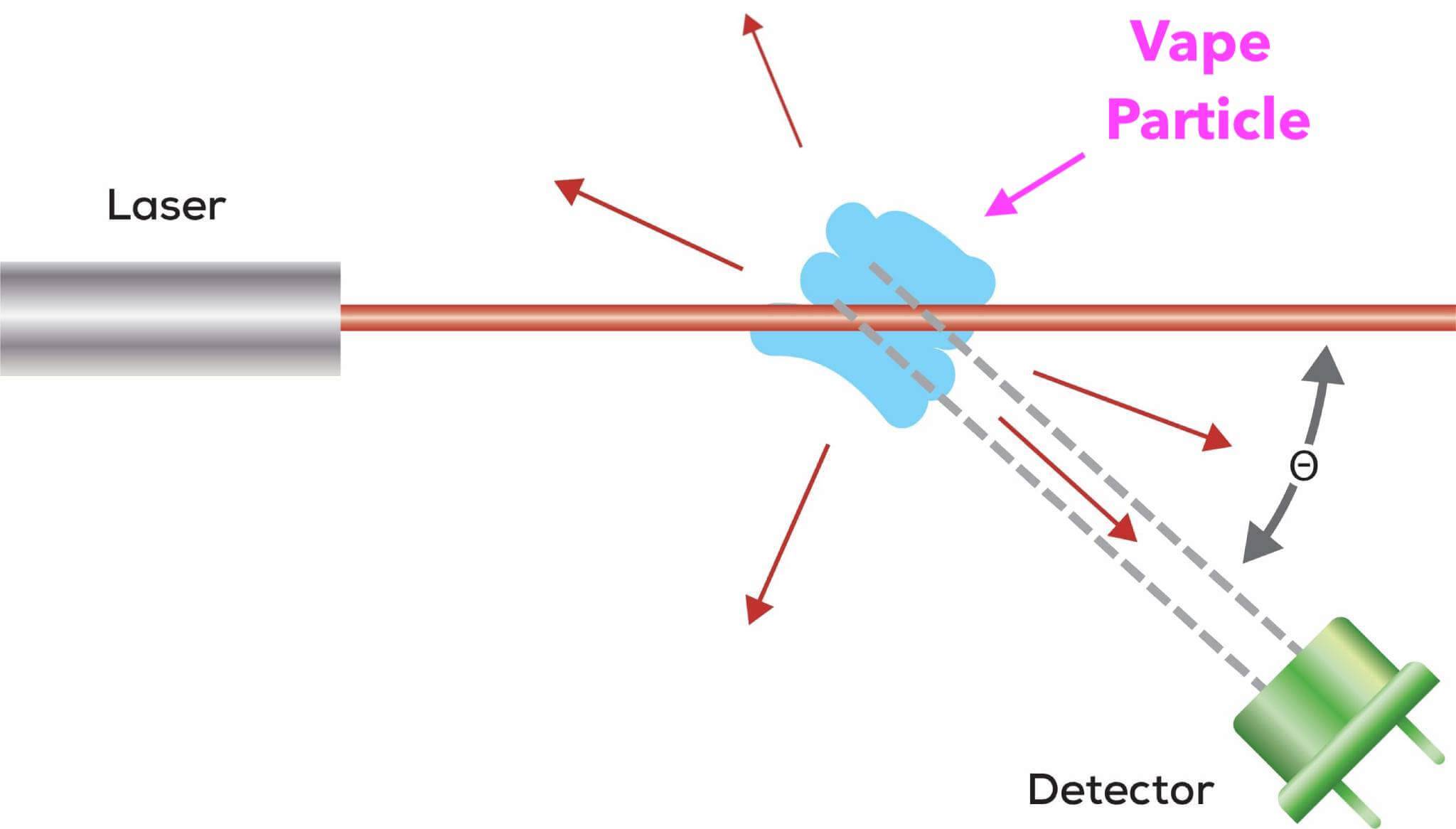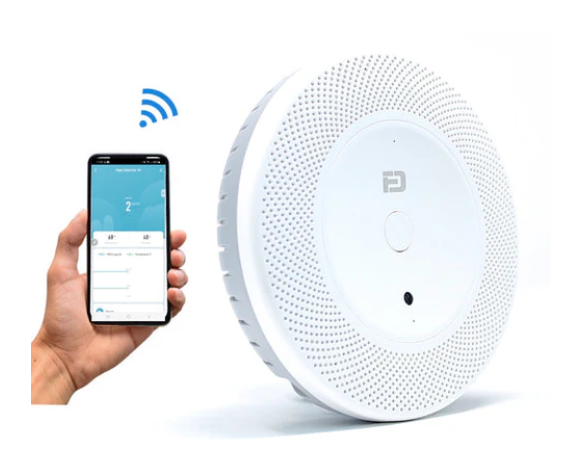Vape detectors are essential tools for assessing the presence of harmful particles in homes, hotels, offices, schools, and other enclosed spaces. A cost-effective solution for detecting vaping or e-cigarette use is a PM2.5 detector, which measures fine particulate matter in the air. These sensitive gas detection devices can effectively identify the presence of vaping or e-cigarette emissions, making them valuable for use by hotel staff, landlords, and property inspectors. By employing PM2.5 detectors as vaping, vaper, or e-cigarette detectors, individuals can ensure a healthier indoor environment and take appropriate measures to maintain air quality in the face of the growing popularity of these devices..
Pros |
Cons |
|
✅ Vape and e-cigarette vapor detectors (PM2.5) are relatively low cost ✅ Many detectors that are able to detect the use of e-cigarettes or vaping can also detect the presence of cannabis and weed smoke ✅ PM2.5 detectors can help landlords and hotel owners solve problems associated with vaping and e-cigarette use |
⛔ Vaping and e-cigarette use is common and increasing ⛔ Vaping and e-cigarettes are often used indoors to deliver nicotine to the body in a fast way ⛔ Limited product options exists to detect vaping and e-cigarette vapor |
The Best Vape Detector?
There are various technologies that detect vape from e-cigarettes. Here are some top and popular units:
- Forensics Detectors Vape Detector Handheld or Wall Mount
- This detector uses advanced laser sensor technology to detect small vape particles emitted during vape or e-cigarette use. Vape Detector info is extensive.
- This detector has 12 sensors that detect particulate caused by vape and smoke, as well as carbon monoxide, carbon dioxide, and nitrogen dioxide gas. Remember, you are paying for the extra bells and whistles.
- Zeptive Vape Detector
- This detector has high sensitivity and low-false flag rate. It works by detecting the components of vape aerosol.
- Triton 3D Sense Vape Detector
- This detector measures chemicals in the air to determine the likelihood and severity of someone vaping in an enclosed space.

How to Use a Vape Detector?
- Turn on the vape detector.
- Leave it in a known vapor-free and smoke-free room for 10 minutes. This will be referred to as a clean room.
- Record a baseline reading of the clean room of the PM2.5 level. You will use this value when comparing to your reading in a suspected room.
- Monitor the levels, and if possible, set alarm thresholds.
- If there is an increase in particle numbers then there is a strong likelihood that vapor particles exist and are suspended within the suspected room.
Do Vape Detectors Really Work?
Yes they do.
See the below video which is a demonstration of our Handheld Vape Detector and comparing it to the responsivity to various home smoke alarms. This is a exaggerated test but gives and insight into the superior sensitivity of PM2.5 sensors in the application of detecting vape particles in the air.
Is there a Vape Detector for Schools?
Yes there is.
The Forensics Detectors Wall Mount Vape Detector is best for stationary situation like hotels, school bathrooms or public restrooms.
This unit employs laser scattering sensor technology to detect the slightest airborne particle from a vape or E-cigarette. This technology is very stable and eliminates false positives. This is the only vape detector that can detect particles from 1 micron all the way up to 10 microns, making it extremely sensitive for a variety of smoke and vape smoke coming from various consumer smoke and vape products. View the vape detector here:

The operation and design is different to the fixed wall mount vape detectors sold by Halo, Zeptive and Triton.
The Forensics Detectors vape detector was designed with use-case considerations in schools, K-12, restrooms, businesses, hospitality toilets, bathrooms, and confined spaces to detect the slightest vapor, smoke, or aerosol particles.
The unit is standalone, and no extra on-going or subscription fees are required to operate the device for cell phone notification.
What Chemicals are in Vaping?
- A study showed that cigarette vapor is made up of aerosols, particulate matter, tobacco-specific nitrosamines (TSNAs), aldehydes, metals, volatile organic compounds (VOCs), phenolic compounds, polycyclic aromatic hydrocarbons (PAHs), tobacco alkaloids, and drugs (amino-tadalafil and rimonabant).
- Pellegrino et al measured the ultrafine particulate matter (PM) fraction yield of e-cigarettes. Data showed that the PM emission values were lower in e-cigarettes compared with the conventional cigarette (eg, PM1=14 vs 80 μg/m3 and PM10=52 vs 922 μg/m3
- In one study, it was shown that PM2.5 concentrations were correlated with the number of e-cigarette users present in a vape-shop.

What is a E-Cigarette?
Electronic cigarettes also known as e-cigarettes, e-cigs, vapers, electronic nicotine delivery systems (ENDS), vape pens, vaping devices, mods and tank systems are battery-operated devices that vaporize a liquid (also known as e-liquid) to produce an aerosol.
Users inhale the aerosol that includes nicotine and other flavored substances.
Is there a Sensor that can Detect Vaping?
Yes there is.
The most effective and low-cost devices are Vape Detector PM2.5 units. This detector is accurate and will detect the slightest particles produced from vaping and e-cigs.
Various brands of vape detectors also employ other sensors to detect VOCs, CO2, light, sound and vibration.
Can Smoke Detectors Detect Vape?
Yes, but not always and not reliably since smoke detectors are not sensitive enough to detector vape. It must be very very smoky for it to detect vape smoke making it an unreliable vape detector. Vapes Detectors are 100x more sensitive than smoke detectors.
Is There a Device to Detect Vaping Odor?
Yes.
A person can smell vaping odor since their nose is smelling the vapor cloud produced during the use of an e-cigarette. The vapor is particulate matter that is microns in size. These continue to rest or float and are aromatic, hence their smell.
The vape detector with a special vape sensor functions essentially as a very sensitive air quality detector, which means it can detect the presence of the aromatic vapor caused by vaping or e-cigarette use.
What Does Vaping Smell Like?
Vaping and e-cigarettes have different smells depending on what is being consumed. Most vape pens and e-cigarettes use cartridges that are flavored with various flavorings related to food, such as fruit, candy, or mint. As a result, the smell of vaping can smell like many different food-related flavorings.
While it is being vaped, the scent of the vape or e-cigarette is amplified. It is often described as "sickly-sweet".
However, some vape and e-cigarette cartridges are filled with marijuana, or cannabis. This type of vapor can have notes that are described as herbal or earthy.
How Long Does Vape Smell Last?
The length of time that the smell from e-cigarette use lasts is mainly associated the indoor ventilation, volume and amount of initial vape smoke volume. For example, lets assume a studnet vapes in the restroom. If the restroom is well ventilated, the vape smoke may quickly dissipate. If not, it will linger and vape smoke particles will accumulate. The vapor particles will:
- Penetrate into porous items, such as the carpet and furniture.
- Over longer periods of time, and dependent on the ventilation in the enclosed space, the aromatic vapor particles will mix into the clean air and reduce in odor.
- High levels of ventilation will allow for the smell to reduce at a faster rate than it will in an enclosed space with poor air circulation.
- If a hotel owner or landlord has problems associated with vape or e-cigarette smell, it is recommended to increase ventilation by implementing blowers or fans, and eventually the smell will dissipate.
How Does the Vape and E-Cigarette Odor Detector Work?
- A vape detector, which is used for detecting poor air quality related to vaping and e-cigarette use, works by measuring the amount of particulate matter in the air.
- Specifically, the vape detector described utilizes advanced laser sensor technology to detect the particulate in the air. The EPA (United States Environmental Protection Agency) definition of particulate matter is the solid and liquid matter (ie particles and droplets) that reside in the air. These detectors measure the level of droplets and particles that are suspended in the air.
- Vaping and e-cigarette use produces vapor particles, which can be measured by the detector in an indoor area.
Does a Vape Detector Work With Cigarette Smoke and Cannabis?
If a vape detector monitors the presence of particulate matter in an enclosed environment, then it would also work with cigarette smoke and cannabis smoke as well.
Vape Detectors (PM2.5 detectors) can measure vapor from e-cigarettes, cigarette smoke, and cannabis smoke.

How Long Do Air Quality Detectors Last?
Air quality detectors that measure particulate optically last 5 years or more. Forensics Detectors Vape Detectors lasts over 24 hours on one charge and has an expected life over 10 years.
How Much Does a Vape Detector Cost?
It depends on the vape detector functionality. A basic handheld vape detector costs about $100. A single unit that is mounted on the ceiling or wall costs between $300 to $1000. Integrated vape detectors for schools that send email notifications costs over $10,000 and with ongoing subscription costs.
Can an Air Quality Test Detect the Presence of Vapor from E-Cigarette Use?
If a PM2.5 detector is used, then a air quality test can do it. Some PM2.5 detectors are often referred to as air quality tests.
Does Vaping Affect Air Quality?
Yes.
Studies have shown that using e-cigarettes has negative effect on air quality in an enclosed and indoor environment. Air quality can also be affected in an outdoor environment with poor circulation.
How Do Vape Sensors Work?
The most effective device for identifying vaping is a laser scattering particulate sensor, commonly referred to as a PM2.5 sensor. These sensors, also known as particulate matter or dust sensors, utilize highly sensitive electronic and optical components to accurately detect products emitted from vaping. PM2.5 sensors demonstrate greater sensitivity compared to VOC sensors used in vaping detection. While VOC sensors have a maximum detection limit of 50 parts per million (ppm), PM2.5 sensors can detect over 1000 micrograms per cubic meter (µg/m^3), as evidenced by research from East Carolina University.

Does Vaping Produce Carbon Monoxide Gas?
No, e-cigarettes and vaping do not produce carbon monoxide gas. As a result, carbon monoxide sensors cannot detect the use of e-cigarettes in an environment
What do Vape Detectors Look Like?
Ceiling mount vape detectors look like smoke detectors or carbon monoxide alarms. Handheld version look like a hand held sniffer and industrial units look like heavy duty control equipment.
Who Needs a Vape Detector?
- Schools to Detect Students Who Vape in restrooms or indoor spaces. Perfect for teachers and administrators.
- Hotel to Detect unauthorized E-Cigarette Usage in Rooms and Lobby.
- Landlords to detect and monitor E-Cigarette Usage by tenants.
Can You Smell Vape?
Yes, you can smell vape aerosol, especially flavored varieties. The scent varies based on ingredients but is typically sweet, fruity, or minty, though dissipates quickly.
Final Words
Gas detection technology has evolved to effectively detect vapor produced by e-cigarette use, as these emissions can significantly impact indoor and outdoor air quality, especially in areas with poor circulation. While most air quality detectors equipped with PM2.5 sensors can monitor the presence of e-cigarette vapor and smoke from traditional cigarettes, standard smoke alarms are not sensitive enough to detect vaping. To accurately identify e-cigarette use in enclosed spaces, specialized vape detectors, which can be considered extremely low-level and ultra-sensitive smoke detectors, are necessary. These advanced gas detection devices employ highly sensitive PM2.5 sensors to detect the minute particulate matter released during vaping, ensuring that even the slightest traces of e-cigarette vapor are identified, thereby promoting a healthier environment and enforcing vaping restrictions where applicable.
About the Author
Dr. Kos Galatsis ("Dr.Koz") is the President of FORENSICS DETECTORS, where the company operates from the scenic Palos Verdes Peninsula in Los Angeles, California. He is a subject matter expert on gas sensor technology, gas detectors, gas meters, and gas analyzers. He has been designing, building, manufacturing and testing toxic gas detection systems for over 20 years.

Every day is a blessing for Dr. Koz. He loves to help customers solve their unique problems. Dr. Koz also loves spending time with his wife and his three children going to the beach, grilling burgers, and enjoying the outdoors.
Read more about Forensics Detectors here.
Email: drkoz@forensicsdetectors.com
Phone: +1 424-341-3886

